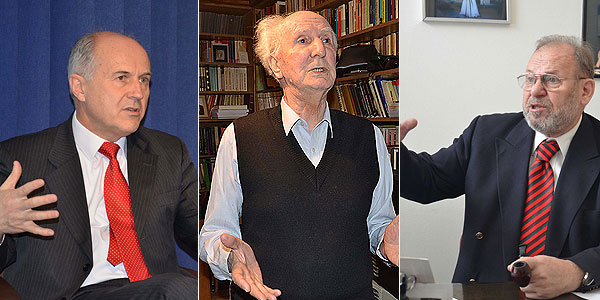ID :
230681
Thu, 03/01/2012 - 14:04
Auther :
Shortlink :
https://oananews.org//node/230681
The shortlink copeid
Bosnia-Herzegovina celebrates 20th year of independence (1)

SARAJEVO (A.A) - March 1, 2012 - Bosnia-Herzegovina celebrates on March 1 the 20th anniversary of the declaration of its independence in a referendum led by the late Alija Izetbegovic and his close friends following the break up of former Yugoslavia and the establishment of Slovenia and Croatia.
Bosnia-Herzegovina celebrates the 20th anniversary of this "honorable day" after paying a painful price.
One of the six federal republics that made up Yugoslavia, Bosnia-Herzegovina had to decide on either becoming a part of the "greater Serbia" or paying a high price on the way to becoming an independent country after Slovenia and Croatia declared their independence in 1991...
Bosnians who gathered together under the leadership of Alija Izetbegovic and his friends decided to hold a referendum for an honorable future. The referendum took place on February 29 and March 1, 1992, despite being boycotted by the Serbians.
64 percent of the people in the country voted in favor of "independence". The Serbs' response to the Bosnian decision was attacks on and massacre against defenseless civilians.
Yugoslavian troops, the majority of which were Serbs, had at that time Europe's fourth biggest military and immediately surrounded the cities of Bosnia-Herzegovina and began attacking on the civilians.
Bosnian Serbs armed by Yugoslav units proceeded to an ethnic cleansing, tortured Bosnians in concentration camps and systematically raped women.
The war in Bosnia that lasted 3.5 years and continued with the "genocide" in Srebrenitsa came to an end in 1995 with the Dayton Peace Agreement.
Paying a "high price" for independence, around 100,000 Bosnians were killed, 50,000 women were raped and 2 million people had to become refugees. Following the ethnic cleansing, almost no Muslim population was left in the cities of Srebrenitsa, Foca, Zvornik, Bratunac and Visegrad in the east of the country.
-Dayton Agreement-
The most bloodiest war in Europe, following the Second World War, in which terrible massacres, systematic rapes and genocide took place, in Bosnia-Herzegovina ended with an agreement signed at the U.S. state of Ohio's Dayton Air Base in 1995. The agreement was signed by the late President of Bosnia-Herzegovina Alija Izetbegovic, Serbian President Slobodan Milosevic and Croatian President Franjo Tudjman with an initiative made by U.S. diplomat Richard Holbrooke.
This agreement silenced weapons but left the country with a political difficulty. The three ethnic structures who were in a war among themselves only 15 years ago came under the same roof as the founders of the country.
The fact that three ethnic structures were the founders of the country made Bosnia-Herzegovina one of the countries in the world with the most complex political administration.
The country was made up of the Serbian Republic (49 percent) and the Bosnia-Herzegovina Federation (51 percent) and a very small autonomous region (Brcko). With the agreement, the Federation of Bosnia-Herzegovina was divided into 10 cantons with separate prime ministers, parliament speakers and ministers.
-Dayton did not bring justice-
The Dayton Peace Agreement, despite silencing weapons, in a way rewarded the Serbs who began the war and responded to the people's demand for "independence" with massacres.
The Serbs, having been rewarded with the Bosnian Serb Republic that controls 49 percent of the country following an ethnic cleansing, continue to keep the international community busy with their demands for "independence" and their decisions that "block" state organizations. The Bosnian Serb Republic has become a "safe haven" for those accused of war crimes and continues to create difficulty for Bosnian refugees who have had to leave their homes.
The "problem of refugees" in the eastern cities of the country, including Srebrenitsa, have not been solved and Serbian population is now in the majority on territory where Bosnians were in majority before the ethnic cleansing.
While the war ended 16 years ago, 120,000 Bosnian refugees wait for the day when they can return to their homes in the Bosnian Serb Republic.
-Price for independence still paid-
While former political leader of the Bosnian Serbs who declared war on Bosnia-Herzegovina after the referendum of March 1, 1992, Radovan Karacic and former military leader of the Bosnian Serbs Ratko Mladic are being tried at the international court in The Hague, many individuals responsible for war crimes still go around free.
The Serbs try to take revenge of the war by arresting those who displayed high courage. The Serbs also try to keep as secret many of the massacres committed against Bosnians and try to take revenge on those they could not silence by weapons.
Eight Bosnian officials, including commander of the 109th Brigade Nezir Kazic who was the great factor in not permitting the fall of Sarajevo during the Bosnian war, Mayor of Hacici Mustafa Celilovic, and Police Commissioner Fadil Covic are still in prison under difficult conditions.





